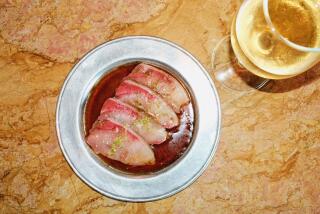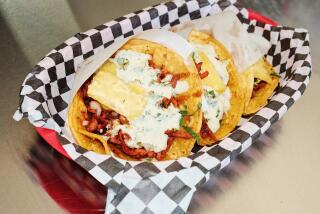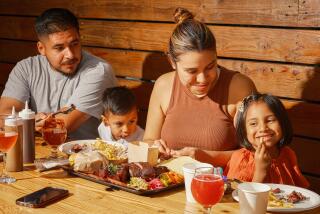Review: In Grand Central Market, a beloved chef begins a new chapter
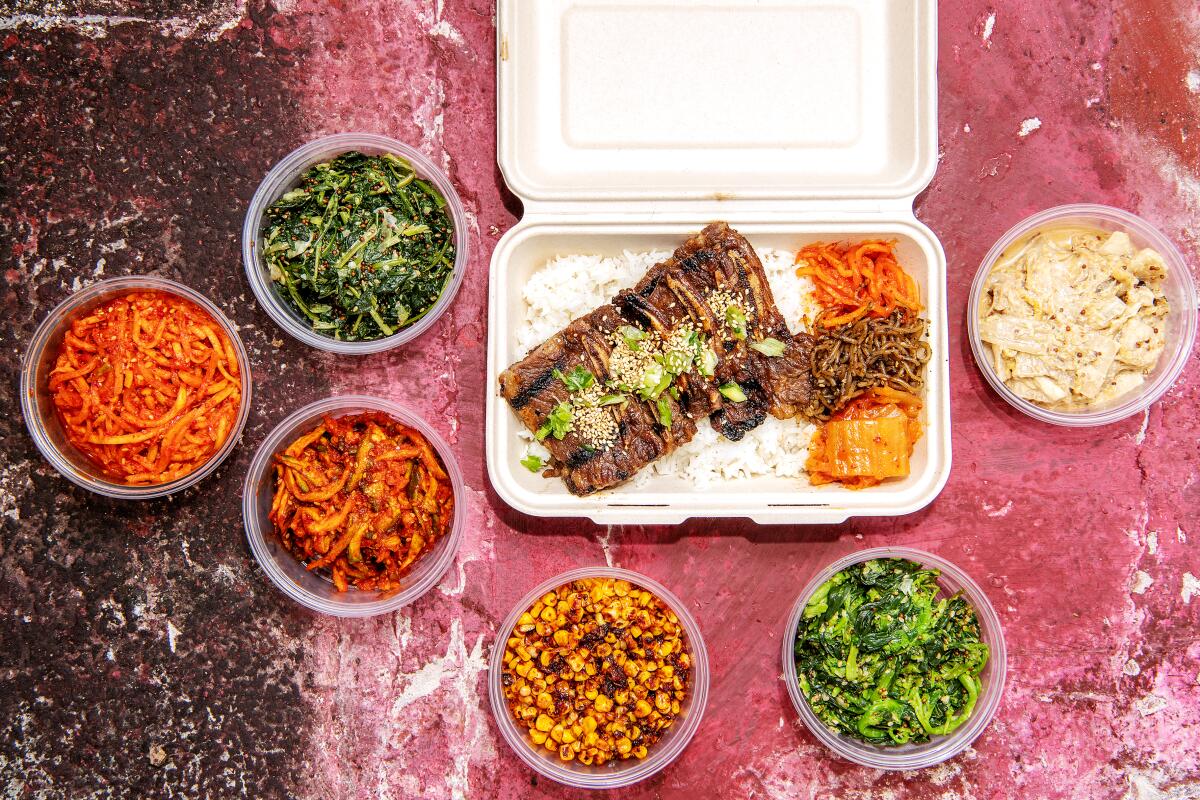
- Share via
Kwang Uh practices what you might call reverse alchemy on corn: He takes a food that’s gold by nature and transforms it through fermentation and fire into a dense, delicious new compound.
The process starts by steeping kernels in the elixir that remains after Uh makes white kimchi, which he infuses with the licorice-y nuttiness of perilla oil and seeds. Some of that essence seeps into the corn too, and after fermentation he stir-fries each batch in a blazing wok with gochugaru (flakes of sun-dried Korean chiles) and paprika. Yuzu juice comes last; it’s the final, lingering flavor that emerges in the “kimchi’d corn” (Uh’s term for the creation) after its smoky heat thumps your taste buds.
At Shiku, the Grand Central Market takeaway stall that Uh runs with Mina Park, his wife, the corn is a regular part of the ever-changing banchan they sell by the pint or half-pint: Mix and match it with a spicy salad of julienned radishes; potent specks of chile-stained dried squid stir-fried with peanuts; satisfyingly mulchy wild greens called chwinamul, fragrant with sesame oil; the wonderful white kimchi, its cabbage leaves slowly melting into milkiness; and a side of plain white rice for a complete, kaleidoscopic meal.
For those who’ve followed Uh’s cooking in Los Angeles, the corn also reopens a specific neural pathway: Its intensity rang through a bestselling dish known as Karma Circulation, a fried chicken bowl with rice and greens and finished with squeeze-bottle spirals of gochujang mayo. It stood out on the menu at Baroo, the 16-seat restaurant he opened in a low-key Hollywood strip mall with childhood friend Matthew Kim in 2015.
Baroo — part fermentation lab, part experimental theater, part meditation hall — was a moment. Saying it served grain bowls and pastas doesn’t capture its wild spirit. It was a place of unsustainable ambition, a kitchen where beets popping with umami from fermentation-starting mold and oxtail ragout zapped with powdered sauerkraut made startling amounts of sense. A culmination of Uh’s experiences all over the world, Baroo became food media shorthand for the type of personal-narrative cooking that galvanized L.A.’s dining culture last decade.
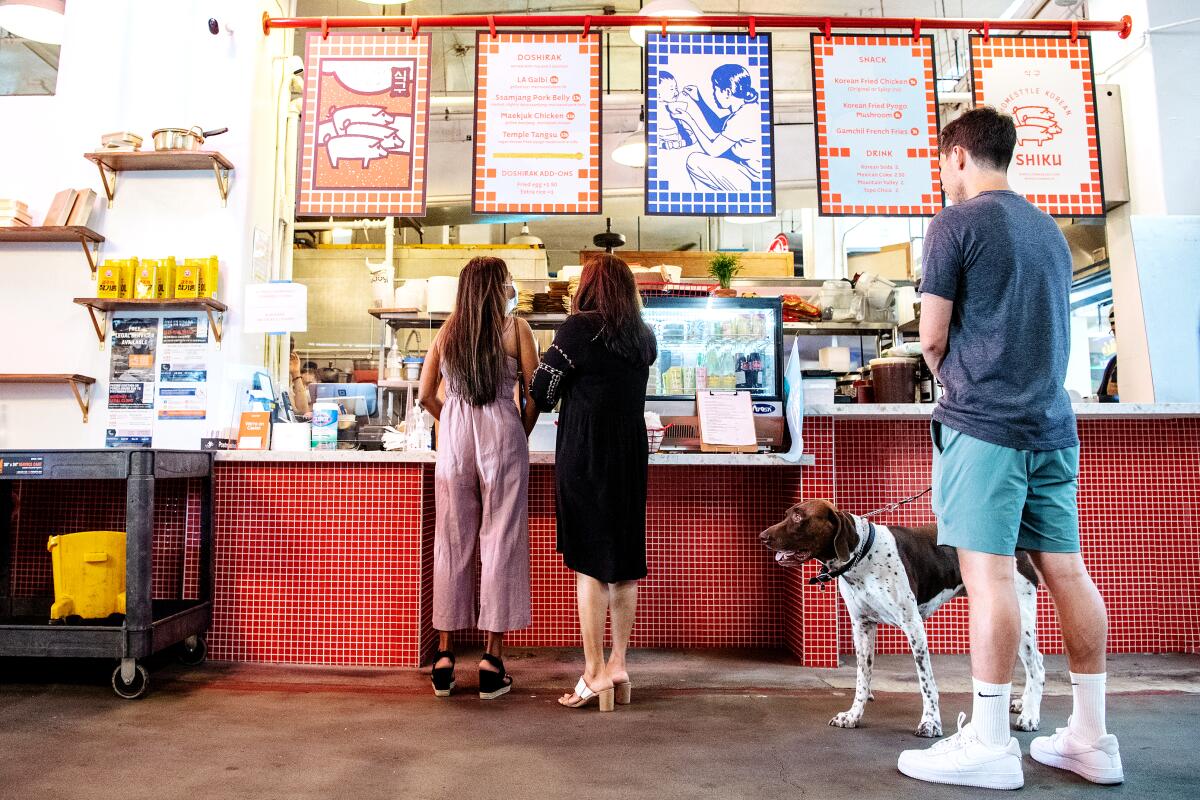
The restaurant operated in fits and starts and finally closed permanently in October 2018. While mounting a full-service restaurant, Uh and Park briefly ran a stop-gap pop-up, Baroo Canteen, in East Hollywood’s Union Swapmeet for nine months in 2019.
Shiku means “family” in Korean. The couple had been approached to run the stall before the pandemic descended. Shiku was meant to be a side project; for now it’s their focus.
It opened in early January, and the realities of 2020 had already introduced many Angelenos to the Korean takeout-oriented dishes Uh and Park had planned for Shiku. We embraced dosirak — Korean lunch boxes, some of which are ornate and compartmentalized while others contain elements that are meant to be combined by shaking before digging in — composed by now-closed Spoon by H and other Korean restaurants all over the metro area. Gazing down at carefully arrayed piles of grilled meats, black-sesame-speckled rice and pickled vegetables could feel like a meditative lifeline in the darkest days of COVID-19.
And though food obsessives have long debated which Koreatown restaurants serve the best spread of banchan to start a meal (Soban is one easy answer), a lot of us learned last year to savor banchan as the meal itself. “I want people to know that banchan doesn’t have to be only small vegetable side dishes,” Jihee Kim of Perilla L.A. reminded me last year. “It can really be anything in the mix of a meal eaten with rice.”
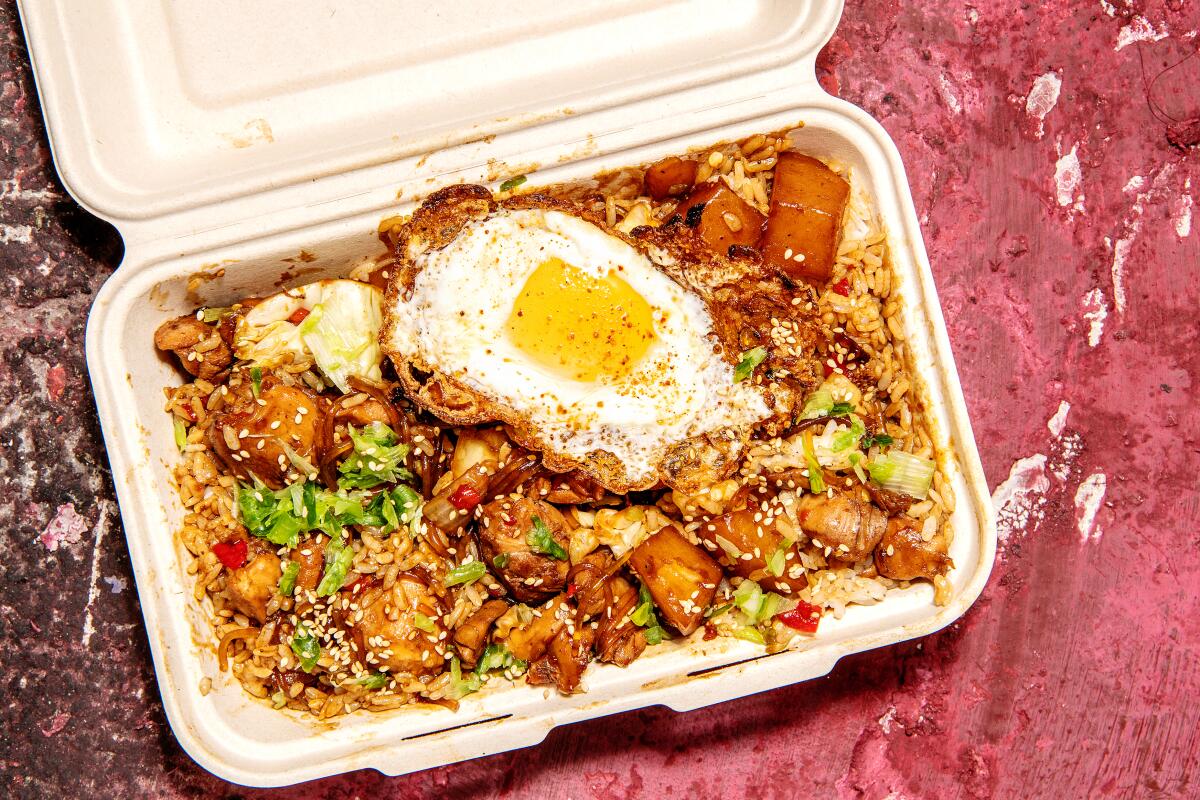
The banchan at Shiku are tunes on a masterful solo album — each song distinct yet connected by an artist’s well defined style. Some of them, like musaengchae (radish salad), hew to tradition with their upfront heat and tang. Others reveal the innovative mind at work behind them. Myulchi bokkeum, a sticky, tangled stir-fry of tiny anchovies, is amplified by dried shrimp, minced shishitos and crushed walnuts. The crunch is akin to snack mix; my brain initially bucks at the whirl of flavors but then wants more.
Uh threads japchae (glass noodles) with gim (the seaweed known as nori in Japan) for a clever play on slippery textures. I’m hoping he’ll up the production on the frequently sold-out black cod banchan, braised in soy sauce seasoned with yuzu syrup and other aromatics with hunks of potatoes and radish and bits of rice cake.
Shiku’s dosiraks are straightforward and soothing: slices of kimchi-braised pork belly; thin, chewy strips of galbi; chicken thighs marinated in doenjang (fermented bean paste that imparts a complex, miso-like sweetness); or battered puffs of shiitake mushrooms splayed over rice, with three small servings of banchan nestled into one end of the to-go container. Lately there’s a frequent special of chicken and vegetables braised in soy and haunted with chiles. It’s a specialty of Andong, a centuries-old city in South Korea on the winding Nakdong River, and it’s my favorite among Shiku’s heftier dishes.
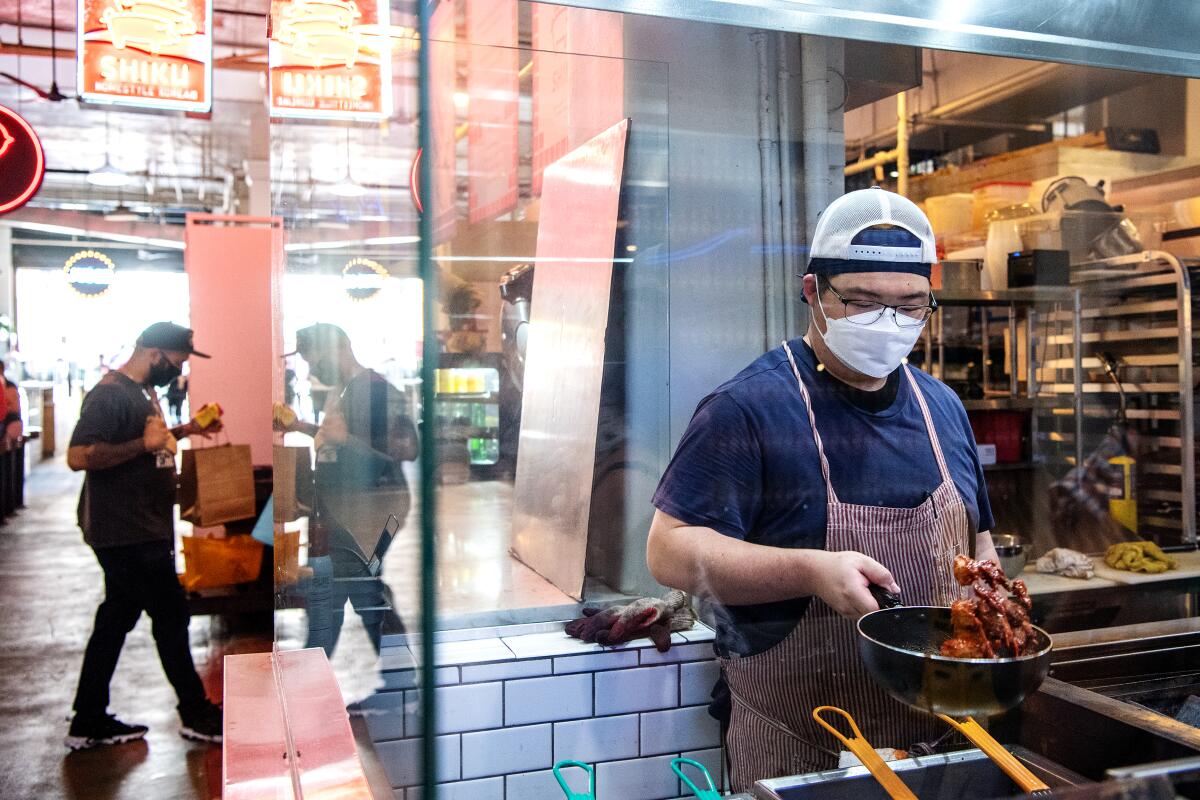
Though every dosirak is packaged for carryout, I’d urge finding a table around Grand Central Market and eating the food as soon and as hot as possible. A warning, though: The landmark building’s name is particularly apt these days. On weekends especially, you’re not so much walking among the vendors and neon signs as being swept along in a sea, like the surge through exits at the end of a Lakers game. Depending on your current mindset, it can make you high on humanity or trigger a panic attack.
Inside Shiku’s stall it’s also cramped; that’s a positive. Uh often stood alone at Baroo’s stove, breathing deep and struggling to stay present as the order tickets piled up. He and Park have hired employees now to share the cooking and man the register. The energy isn’t as manic. Neither is the creativity. It wasn’t designed to be. Baroo’s fans can wait until its next incarnation for some of the old wizardry. At just this juncture of the world, there’s deeper value in stability and comfort food.
Shiku
The team behind Baroo returns with a Korean comfort-food stall in Grand Central Market.
Location: Grand Central Market, 317 S. Broadway, Los Angeles, (213) 265-7211, shikulosangeles.com
Prices: snacks, $3-$6, dosirak $9.50-$15, banchan $3-$19
Details: 11 a.m.-7 p.m. Wednesdays to Sundays. Credit cards accepted. No alcohol. Street and lot parking.
Recommended dishes: kimchi’d corn; braised cod banchan; white kimchi; myulchi with shishitos, dried shrimp and walnuts; Andong-style soy-braised chicken
More to Read
Eat your way across L.A.
Get our weekly Tasting Notes newsletter for reviews, news and more.
You may occasionally receive promotional content from the Los Angeles Times.
